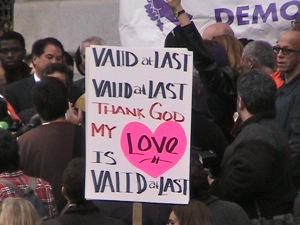In 2009, the mainline Christian denominations continued to be drawn into conflicts around wedge issues such as same-sex marriage and ordination of women. These conflicts over wedge issues may be exacerbated by religious conservative activists, including the misnamed “Institute on Religion and Democracy” (IRD), and overseas groups such as the conservative Anglican bishops in Africa who continue to intervene in the U.S. Episcopal Church. Indeed, according to some observers, groupslike the IRD use wedge issues to deliberately sabotage mainline and liberal Christian denominations.
2009 saw growing rifts in the Episcopal Church, and ongoing conflict in the United Methodist Church, the Presbyterian Church (U.S.A.), etc. I was unable to determine if the United Church of Christ continued to face the problem of conservative individuals funded by outside groups taking over local congregations. Back in 2006, in an interview with Dan Wakefield, theologian Harvey Cox said, “The energy of mainline Protestant churches has been absorbed by the battles over abortion, and over gay rights and gay marriage that’s divided entire denominations in recent years. There’s nothing left over for the kind of battles that were fought in the past for peace and justice in the nation and the world.” (The Hijacking of Jesus, p. 102) Three years later, the situation has not changed.
Unitarian Universalism, closely related as we are theologically and historically to the mainline churches, has been affected in different ways by the continuing conflicts over wedge issues. Because we embrace same-sex marriage, women’s right to choice, and ordination of women, Unitarian Universalism has become marginal in U.S. political culture; it is difficult to believe that any Unitarian Universalist could become president of the United States. We Unitarian Universalists seem to have embraced our politically marginal status to the point where many Unitarian Universalists automatically stake out politically liberal positions — without ever determining if political liberalism and the Democratic party can be equated with religious liberalism. This peculiar politico-religious orthodoxy continued to hamper open conversations about, and honest critiques of: second-wave feminist theology; identity politics; and the way we are beholden to consumer capitalism. Yet second-wave feminism primarily benefits upper middle class white women; identity politics forces the kind of binary identity choices that we say we deplore in theology; and consumer capitalism directly contradicts several of those “seven principles” that we tout.
In another part of the region where liberal religion and politics intersect, the religious right has been doing a very good job or helping liberal Christians (and, to the extent they bother with us, helping Unitarian Universalists) stay on the margins. A very public example of this marginalization is Barack Obama. Religious conservatives forced Obama to repudiate his liberal Christian UCC church during the campaign, and since then the Obama family has not settled on a regular church to attend — I suspect that the Obamas can’t stand the theology of the politically acceptable churches, while Barack Obama can’t stand the political consequences of attending another UCC church, or any liberal Christian church for that matter. The situation has gotten bad enough that, to the best of my knowledge, the Obamas did not attend church on Christmas eve. (A BBC commentator has suggested that the Obamas would best fit in with Florida Street Friends Meeting [Quaker] in D.C., and I suspect he’s right — but such a church choice would be political suicide.) Obama is but one prominent example of the marginalization of liberal Christianity in U.S. political life.
As a religious educator, I can’t help adding that this is not good for the religious education of the Obama children. Their children need exposure to a living religious community in addition to whatever home-based religious education the Obamas may provide. Michelle, forget the political cost to Barack — take the kids to Florida Street Meeting!
———
One can only hope that in 2010 we religious liberals — especially we Unitarian Universalists — learn to start from liberal theology, rather than starting from liberal politics. Instead of toeing the politically liberal party line, let’s clearly articulate the religiously liberal party line: that individual salvation is not good enough because we have to save the whole world; that it’s most important to help those who are poor, those who are suffering, and those who have been pushed to the margins of society; that women are just as good as men; that consumer capitalism treats human beings as mere consumers, and falsely states that the highest good in life is buying more stuff. From a pragmatic point of view, maybe we’ll be doing many of the same things — but we’ll have religious, not political, reasons for doing them.
And if we can do that, we’ll really be newsworthy.


